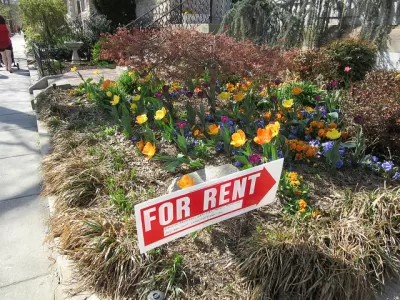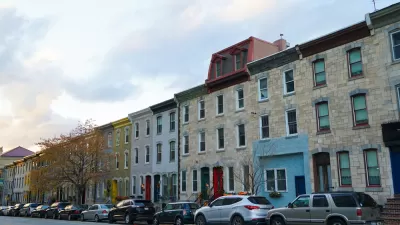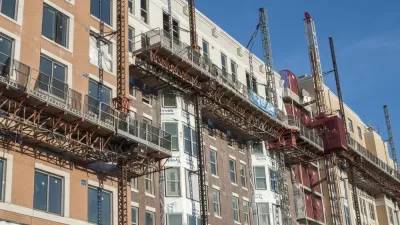Dozens of cities and states are considering legislation allowing alternatives to upfront security deposits, such as "security deposit insurance." The only problem? It's not actually insurance.

In January, Cincinnati became the first city to pass a "Renter's Choice" law, which requires that landlords accept alternatives to the traditional lump-sum security deposit. Atlanta followed suit in early October, and elected officials in at least 10 other cities and states across the country, from Alabama to California, have proposed similar legislation.
On the face of it, allowing alternatives to upfront security deposits should be a good thing. As many housing advocates know well, high upfront moving costs act as a barrier to securing affordable housing for low- and middle-income renters, and can even keep people homeless. When you include first month’s rent, security deposit, application fees, and other miscellaneous expenses, the price of a move can run into the many thousands of dollars at a time when 40 percent of Americans say they don’t have the cash to cover a $400 emergency expense.
Some community development credit unions have started offering low-interest loans to help low-income renters clear the security deposit hurdle.
While the Cincinnati law’s required options include spreading the payment of a deposit across six monthly installments, the laws are being actively promoted by a company that provides one of the other options: Rhino, a venture capital–backed startup founded in 2017, sells a product called "security deposit insurance." Following a string of successes with Renter's Choice, including a temporary version that Gov. Andrew Cuomo enacted in New York state in response to the COVID eviction crisis, Rhino announced last month that 1 million customers across the country are now using its product in lieu of a traditional deposit. The startup’s annualized revenue reached $21 million in November, a 21-fold increase over a span of 18 months.
Deposit alternatives like Rhino's have been around for about two decades, but the pool of potential customers has always been seriously restricted by the number of landlords willing to accept those alternatives. In its 2019 Renter’s Choice policy proposal, the startup argued that giving every renter the option to purchase its product instead of paying a large, upfront deposit would be a boon for affordable housing and a form of economic stimulus.
“Security deposits are tying up over $45 billion in cash. This is money that could otherwise be reinvested into local economies or used by hard working Americans to cover critical expenses like healthcare, childcare, student loan debt, and other burdens,” the proposal says.
It’s not surprising that Renter's Choice sounds appealing to some housing advocates
"Allowing people to opt for Renter's Choice instead of a large, lump-sum security deposit is a great solution," said Michelle Heritage, executive director of Community Shelter Board in Columbus, Ohio, where the City Council is considering a Renter's Choice law that has broad support. Her organization helps homeless people find affordable rentals, and the cost of deposits presents a significant challenge, she said. "As the housing market has become hotter, property owners ask us for double security deposits for people who they deem as second-chance renters. Oftentimes, this is upwards of $2,000. That’s a lot of money to save working minimum wage. This financial barrier keeps people homeless," said Heritage.
However, there is a dark side....
FULL STORY: Security Deposit Alternatives: The Misleading Marketing of ‘Renter’s Choice’

Alabama: Trump Terminates Settlements for Black Communities Harmed By Raw Sewage
Trump deemed the landmark civil rights agreement “illegal DEI and environmental justice policy.”

Study: Maui’s Plan to Convert Vacation Rentals to Long-Term Housing Could Cause Nearly $1 Billion Economic Loss
The plan would reduce visitor accommodation by 25% resulting in 1,900 jobs lost.

Planetizen Federal Action Tracker
A weekly monitor of how Trump’s orders and actions are impacting planners and planning in America.

Waymo Gets Permission to Map SF’s Market Street
If allowed to operate on the traffic-restricted street, Waymo’s autonomous taxis would have a leg up over ride-hailing competitors — and counter the city’s efforts to grow bike and pedestrian on the thoroughfare.

Parklet Symposium Highlights the Success of Shared Spaces
Parklets got a boost during the Covid-19 pandemic, when the concept was translated to outdoor dining programs that offered restaurants a lifeline during the shutdown.

Federal Homelessness Agency Places Entire Staff on Leave
The U.S. Interagency Council on Homelessness is the only federal agency dedicated to preventing and ending homelessness.
Urban Design for Planners 1: Software Tools
This six-course series explores essential urban design concepts using open source software and equips planners with the tools they need to participate fully in the urban design process.
Planning for Universal Design
Learn the tools for implementing Universal Design in planning regulations.
Caltrans
Smith Gee Studio
Institute for Housing and Urban Development Studies (IHS)
City of Grandview
Harvard GSD Executive Education
Toledo-Lucas County Plan Commissions
Salt Lake City
NYU Wagner Graduate School of Public Service





























